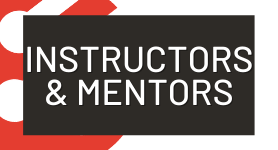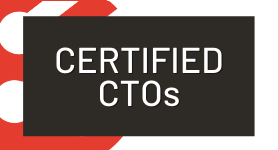District Administration Technology Leadership Academy
The Chief Technology Officer training program produces qualified California school district CTOs. The program raises the bar for technology leaders and creates a community of support through mentorship and collaboration. The program also seeks to inform Superintendents and District Leaders of the importance of a cabinet level CTO position.
The program is managed and sponsored by CITE and supported by the California Department of Education, the Fiscal Crisis and Management Assistance Team (FCMAT), and the California County Superintendents Educational Services Association (CCSESA). The program is governed by a steering committee made up of technology leaders throughout California representing CITE, CDE, FCMAT, CCSESA, as well as industry leaders and graduates. This collaboration ensures a rigorous and relevant curriculum is consistently delivered.
Applicants for Cohort 17 (2023) are available NOW!
Submit An Application! Submit A Nomination!
 |
 |
 |
Qualifications
A successful candidate for the CTO Mentor Program should currently be involved in some facet of technology and employed by a public or private school, district, county or state organization. Ideally, the application would include a nomination from the candidate’s superintendent or other individual from the candidate’s organization that demonstrates organizational support for the candidate’s participation in the program. The successful candidate will have experience in a professional setting (a minimum of four (4) years is preferred), a demonstrated expertise in technology (such as programming, system installation and management, e-rate or network management) and have or show potential in the following areas:
- Written communications, including being able to submit by the deadline a well written, complete application along with a resume and nomination form
- Oral communications, including presentations at professional development events and/or school board meetings, etc.
- Leadership, including experience as a department leader or project manager, or in another leadership role
Human resource management, including experience supervising and evaluating staff - IT Customer Service: networking, servers, desktops, user support
- Analytical abilities/logical thinking skills, including involvement with or management of large projects
- Fiscal management, including experience developing or assisting with the development of a technology budget, experience with school finance or purchasing, categorical fund acquisition and/or contract procedures
- Facilitation skills and people skills, including experience working with groups to engage them in activities such as planning, monitoring or problem-solving
- Involvement in the K-12 community (CITE, CUE, CASBO, ACSA, CoSN, ISTE, etc.)
In addition, the candidate should have a career objective to become a fully qualified CTO in K-12. Continued employment in K-12 throughout the program is required.
Responsibilities:
Each candidate must do all of the following to be successful:
- Communicate consistently with your mentor
- Complete all prerequisite assignments prior to each session
- Attend all eight sessions and actively and constructively participate in class activities and discussions
- Complete all assignments on time and receive a passing grade from the instructor
- Complete class oral presentation as assigned
- Complete the final oral presentation as assigned
- Provide constructive feedback to the program
- Follow professional norms in the CCTO Code of Ethics
Curriculum
The CTO Mentor Program follows three learning strands that are essential to participants with the ambition and potential to be technology leaders in executive positions for California’s public schools as well as those who want to better support the leadership with a full understanding of the organization as a whole. Each strand has a subset of topics that will be delivered throughout the year.
Candidates are required to attend classes face to face each month. The location of the classes will alternate from Northern to Southern California and follow the conference. Between classes, candidates work with their mentors on the assignments given by instructors. Oral presentations are also required.
Technology
The Technology strand will cover four principles:
- Security Fundamentals – including information security, information security assessment, business continuity, risk assessment and budgeting for security.
- Infrastructure – including data delivery and distribution and systems.
- Technology Services – including hardware and software currency, planning for internal services and desktop support.
- IT Knowledge – including standards development and technical concepts.
Education
The Education strand will cover five principles:
- Student Centered Aspects – including privacy and confidentiality, student data, integrating with other departments, local, community, state, federal requirements.
- Staff Centered Aspects – including supporting Human Resources, classified/certificated aspects, the union environment, STRS/PERS and credentials.
- Educational Technology - the tools and resources available to teachers as well as strategies for better learning.
- Assessment and Accountability – including state assessments, defining accountability and local systems.
- Finance Centered Aspects – including sources of funding, mandated items and categorical funds, purchasing, bidding and vendor relations, facilities funding, attendance and planning.
Leadership
The Leadership strand discusses seven principles:
- Professional Development and Training – including aligning training to state and district standards, developing a scope and sequence for training, research and development for training models, personal professional development.
- Vision and Technology Planning – including developing a vision for technology, assessing technology needs, involving stakeholders, developing a technology plan and assisting sites with technology plans, investigating future technology trends, designing sustainability models.
- Communications and Public Relations – including advising on the use of technology, developing vendor projects, collaborating on joint projects, communications with the public and with the school board, site visits, customer service and initiating partnerships.
- Personnel Management – including recruitment, interviewing and selection, orientation, team building, staff communications, performance and evaluation, motivation, managing conflict.
- Organizational Management – including mission and goals, departmental organization, systems and solutions, managing change.
- Fiscal Management - including building a budget, decision tools (TCO/ROI).
- Project Management – including defining project management, using project management tools and projects and strategic planning.
Cost & Travel Information
The program consists of eight (8) classes held on Friday evenings and Saturday, all day. The initial kickoff session lasts the full day on Friday. Tuition costs for the CTO Mentor Program is $2,800 in 2023. Participants are responsible to pay for their own travel and lodging to classes. Lunch is provided on Saturday. Tuition can be paid by check, money order, Visa, MasterCard or Discover.
We encourage asking your employer to sponsor you. This program will benefit your employer by providing a first class professional development program. Some possible sources of funding include grants, other professional development funding or the general fund.
Read the latest studies on the CTO Mentor Program!
CTO Mentor Program: Examining the effectiveness of the CTO Mentor Program and its impact on the K-12 technology leader's career
By Dr. Julie Judd
A Case Study of Promising Practices Mentoring K-12 Chief Technology Officers
By Dr. Stephen Choi
| Item Name | Posted By | Date Posted | |
| 2021 CTOM Recertification Instructions PDF (1.22 MB) | Administration | 1/22/2021 | |
| Dissertation by Dr. Stephen Choi.pdf PDF (176.92 KB) | Administration | 9/23/2018 | |
| Dissertation by Dr. Julle Judd.pdf PDF (177.3 KB) | Administration | 9/23/2018 | |
